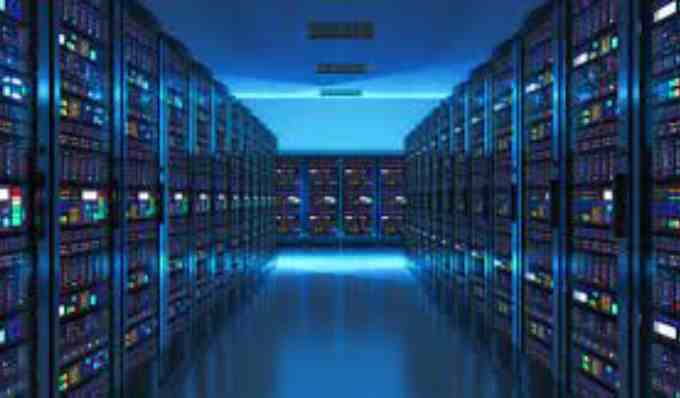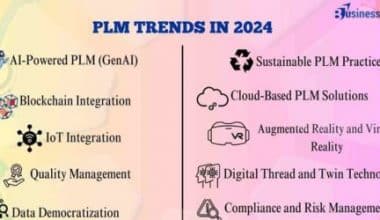Colocation Data Center provide services to corporations or companies to rent areas for their network equipment. Colocation data center is used by companies who do not have the means to manage their own data centre. There are colocation data center providers who rent out this space as a business. We shall learn more about the benefits, services, and market growth of colocation data center in this article.
Colocation Data Center
A colocation data center, sometimes known as a “colo,” is any sizable data center building that rents out rack space to outside parties for their servers or other network equipment. Businesses that might not have the funds necessary to run their own data centre but yet want to reap the benefits employ this highly popular service.
Colocation data center enables businesses and organizations to rent space for servers and other computing devices. The demand for colocation data center has expanded because it helps business with data center administration, planning, operational strategies, risk management, and other things.
They have a cooling system, an IP system, and a facility for power backup. When a business or organization is unable to build its own colocation data centre, it buys space from other colocation data centers in the form of cabinets or racks. Colocation data centers are less expensive, more dependable, easily scaleable, and more convenient to locate near users than previously employed data centers.
As a result, they are widely used in numerous industries, such as government, retail, and the domains of banking, insurance, and financial services, as well as those of healthcare, information technology, manufacturing, and energy.
Colocation Data Center Providers
Colocation Data center providers are putting a lot of attention on innovation and energy-efficient solutions to suit every customer and regulatory requirement.
Organizations seek colocation data center providers to offer more services beyond the standard space, power, and cooling in order to manage data center closures, consolidations, migrations, and developing core-to-edge initiatives. Today, colocation data center providers who offer additional services to support hybrid and digital transformation programs are erasing the distinctions between retail, wholesale, and managed service providers.
In order to integrate various applications, data types, and data sources in a safe, predictable, and lower-latency manner that enables digital business success, organizations deploy colocation services with data center interconnect fabrics. Data centers are frequently becoming noncore, remote facilities used only for legacy software and non-x86 workloads. To support edge-to-core digital goals, certain colocation providers provide interconnection services.
Examples of Colocation Data Center Providers
- Equinix.
- Digital Realty.
- Coresite.
- Flexential.
- Databank.
- Cyxtera.
- Evocative.
- H5.
Colocation Data Center Services
Colocation data center services involves providing a safe environment for hardware and network connectivity that makes it possible to reach consumers all over the world. Usually, the customer provides the servers, while the colocation provider provides the building, cooling, power, bandwidth, and physical security. The facility’s capacity is rented out by the rack, cabinet, cage, or room.
Understanding Colocation Data Center Services
Colocation facilities connect other companies’ servers, storage, and networking equipment to a range of telecommunications and network service providers with the least amount of expense and complexity possible. They also provide space, electricity, cooling, and physical security for that equipment.
Businesses can rent physical space for their servers or computing hardware and co-locate in a third-party data centre rather than retaining servers in-house or in a private data centre. The provider of the data centre handles crucial components like network connectivity, power, and cooling.
Businesses that use colocation services buy their own hardware and pay a colocation provider for the resources and space in the data center. After then, the person is in charge of installing, configuring, and maintaining their server.
The customer must buy their own physical server in order to set up a colocation hosting arrangement. The consumer only leases space from the hosting provider, just like they would at a rental storage facility, rather than renting a server from them. The client moves the server physically to the colocation hosting provider’s office, which is often a data centre.
The customer retains ownership and control of all hardware and software configurations for that server but just leases space within the data centre or colocation facility. The customer can swiftly upgrade or downgrade capabilities like bandwidth and Rackspace to suit the demands of the business by talking with the colocation hosting provider’s team.
Types of Colocation Data Services
Many companies opt to stop hosting their IT infrastructure internally because they like the flexibility of still being able to control their own equipment. Although it may be readily scaled up as the firm expands, space is rented based on their needs.
Colocation data centers provide managed services, space, power.
#1. Space
Customers’ IT infrastructure is housed in colocation data centres in arrangements such as cabinets, cages, and private suites:
#1. Cabinet
With a typical height of 84 inches (7 feet), cabinets are appropriate for networking and server colocation deployments at the basic level. A tiny deployment might be 1 cabinet as a point of comparison, while a larger deployment might be 75 cabinets.
#2. Cage
It enables the modification of a secured area of a colocation provider’s facility to meet the unique demands of deployment. There are two types of cages: shared (less than five complete cabinets) and private (at least five full cabinets).
#3. Private Suites
This is a section of a data center that is walled off from the rest and can be customized to a customer’s specifications while providing more autonomy, privacy, and security.
#2. Power
Customers who use colocation data centers receive high power availability, including backup power in the event of a power failure. Electrical backup generators, batteries, power distribution units (PDUs), uninterruptible power supplies (UPS), switchgear, and transformers make up the facility’s power systems.
Benefits of Colocation Data Center
There are numerous wonderful advantages that businesses or even individuals who employ colocation data center services may take advantage of. The following are some of the most important considerations when determining if this kind of service is a viable choice.
#1. Cost-Effective
It is clear which option is more affordable when comparing the costs of a colocation data center with those of creating your own facility. The prices will be significantly reduced when employing a colocation option unless your equipment demands a significant quantity of space.
#2. Fewer Technical Staff Members
You won’t have to bother about things like managing power, installing equipment, running cables, or performing any number of other technical tasks. The colocation data center will frequently even be able to replace parts or carry out other services as needed. This implies that you don’t need a sizable IT staff on staff to accomplish this work.
#3. Exceptional Reliability
Colocation data centers are frequently constructed to the strictest standards for redundancy. his contains numerous network connections made possible by various telcos, standby power generators, good physical security, and many other things.
#4. Geographic Location
You can decide where your data center will be located in relation to your users.
#5. Expenses Are Predictable
The costs incurred by a colocation data center are fairly predictable. Contracts lasting one year or longer are frequently available, so you may plan your budget for your IT requirements.
#6. Simple Scalability
You may quickly have extra servers or other equipment added to the facility as your business expands. It can be significantly more challenging to expand when you have your equipment in a tiny local data center or server closet.
Colocation Data Center Market
Colocation data center market which was estimated at USD 3912.1 million in 2021, is expected to expand at a CAGR of 13.22% from 2023 to 2030 to reach USD 1,30,938 million. The market’s primary growth drivers are the rising demand for scalable data centers, which has reduced overall IT spending, and the complexity of data centers as they get more complicated. The market is also growing as a result of the increase in robotics and automation utilized for server installation, disc storage management, and connectivity management.
In the study on the worldwide data center colocation industry, the market is in-depth assessement. The market is comprehensively evaluated in the study on the global data center colocation industry. The research provides a thorough analysis of the market’s key segments, trends, drivers, restraints, competitive environment, and other important elements.
Overview of the Global Data Center Colocation Market
The growing digitization of various industries, together with the rising adoption of hybrid cloud computing and virtualization systems, is one of the major reasons driving the rise of the colocation data center market.
The documents can be maintained remotely from locations outside the customer’s premises if the colocation data centres are unable to keep them secure. The growing adoption of secure, scalable, and trustworthy infrastructure for business continuity and data recovery requirements is another driver fueling the market’s growth.
The enormous amount of information coming from social media and over-the-top platforms has raised the demand for data centers and colocation services. The number of people using social media is rising fast, which is contributing to a rise in the amount of data coming from such sites.
What is the Reason Behind the Increase in Colocation Data Center Market.
The Covid-19 pandemic has also led to a rise in the use of OTT and streaming services, which has sped up data flows and is anticipated to help industry growth. Additionally, due to the development in small- and medium-sized enterprises (SMEs), particularly in developing countries, the deployment of modular data centers has rapidly grown to keep up with the growing network complexity. Because SMEs also face financial limitations, cost reduction will become a primary focus for the company’s expansion.
Small businesses can cut operational expenses and overhead by putting in place a colocation data center. Because of this, small and medium-sized businesses think that colocation data center facilities are better than owning and maintaining them in order to promote market expansion.
Two further factors that are anticipated to propel the market’s expansion are the e-trade industry’s expanding requirement for data storage facilities and significant upgrades to the IT infrastructure.
On a worldwide level, however, high beginning and setup costs as well as network capacity constraints are key market restrictions. An internal data center demands high levels of data security and integrity, continuous running expenditures, and startup costs. The establishment and protection of an internal data center pose a serious threat to the financial and physical security of a firm.
Colocation service companies successfully handle this issue by offering rack space, power, cooling, networking, bandwidth availability, firewalls, and other such amenities in exchange for monthly rent—which removes the capital value for firms. Additionally, during the projection period, there are opportunities for the global market due to the rising use of hybrid clouds, virtualization, and company security concerns.
Colocation Data Centre Market Segmentation By:
Colocation Type
- Retail
- Wholesales colocation
Enterprise Size
- Small-medium
- Large enterprises
Industry
- BFSI
- Healthcare
- Energy and utility
- IT and telecom
- Retail and e-commerce
- Manufacturing
- Government and public sector
- Media and entertainment
Region
- North America
- Europe
- Asia pacific
What Is the Difference between a Data Center and Colocation?
Data centers are where your data is located whether you use colocation or cloud computing solutions. The distinction is that with cloud computing, you lease the servers from the data centre while with colocation, you own the servers but not the data centre.
What Are the Types of Colocation Data Centers?
The three primary categories of data centres at a colocation facility include:
- Retail colocation data center : Customers rent space inside a data center, such as a rack or a sectioned-off area.
- Wholesale: A wholesale co-tenant rents a space in a finished data centre.
- Hybrid Cloud: In a hybrid cloud colo deployment, on-premises and external data centre solutions are combined.
What Is Another Name for Colocation Data Center?
Colo, or carrier hotel, is another term for a colocation data center.
What Are the Three Types of Data Centers?
Data centers are facilities where data are stored. They are different types of data centres:
#1. Colocation Data Center
A colocation data centre, commonly referred to as a “carrier hotel,” is a type of data centre where the owner lets you rent out space, equipment, and bandwidth.
#2. Enterprises Data Center
Organizations construct and own these exclusive data centres for their own internal end customers.
#3. Cloud-based Data Center
You can create a virtual data centre on the cloud by utilizing third-party cloud services. Similar to colocation, instead of merely renting the hardware and configuring it yourself, you may benefit from particular services.
What Are the 5 Elements of a Data Center?
The five crucial components that every data center needs to be successful are power, cooling, security, scalability, and location.
Why Is IT Called Colocation?
Given that a colocation data center is a physical room, building, or establishment that holds IT infrastructure for developing, operating, and providing applications and services as well as for storing and managing the data related to those applications and services.
What Are the 3 Main Components of a Data Center Infrastructure?
The three main components of a data center infrastructure are servers, networking equipment, and storage devices.
In Conclusion,
There are many benefits to colocation data center. The fact that colocation results in significant cost savings, especially when compared to managing a data center internally, is one of its key advantages. Colocation data center will be a good choice especially if you are starting out.
FAQs
Who needs colocation?
Colocation is only appropriate for needs in long-term IT infrastructure. You keep full ownership and total control of your equipment while renting a secure area in a data centre with electricity, cooling, and connectivity.
What is the difference between cloud and colocation?
The management and storage of data is the primary distinction between colocation and the cloud. In the cloud, data is managed virtually and the cloud provider owns the servers. Servers in a colocation environment are owned by the company renting the space, not the colocation facility.
What is a colocation strategy?
Organizations that employ colocation must rely on a service provider to keep everything running well and to maintain a clean facility even though they use their own hardware. Organizations must specify their goals for a colocation strategy in order to achieve this.
Related Articles
- WHAT IS A DATA CENTER: Meaning, Types & Difference(
- 10 Things You Need To Consider Before Engaging A Data Centres Company In Australia
- CALL CENTER: Meaning, Services, Software & Training
- Call Center Job Description: Complete Guide
- CALL CENTRE: Definition, Types, Salary, Inbound & Outbound
- IT SERVICE PROVIDER: Top Companies, Managed & Small Businesses






